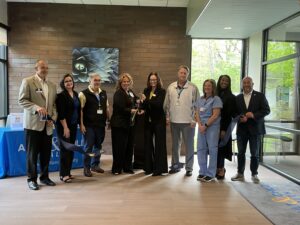Team Zenith might sound like a superhero squad that fights crime and lives on a mountain, but at A&C, these individuals are simply superheroes who walk people through mental illness and drink lots of coffee. Today, Team Zenith is an iteration of a program that has existed at Adult and Child for the past 20 years. As long as the agency has provided community services to adults, Team Zenith has been there, sometimes operating under different names. “We still have a lot of clients who have actually been a part of Zenith for 15 to 20 years,” said Team Leader, AhNonda Bates.
AhNonda and her colleague, Ashley Eppich, are Team Leaders and both manage teams of Skills Development Specialists. Team Zenith also employs a Community Based Therapist to provide traditional therapy sessions and a Peer Recovery Specialist who has dealt firsthand with the issues clients face and can counsel from experience.
At the core, Zenith is dedicated to providing skills development and community based treatment to adults with serious mental illness. For Skills Development Specialists, that means driving around the metropolitan area, meeting with clients in their homes or anywhere they can. It means driving people to doctor’s appointments or the grocery store. It means counseling clients one-on-one about how to manage finances or find new housing. It means making sure a client understands as much as they can about their mental illness & medications, and being there in the moment to help them use coping skills. “Because of their mental illness, it’s easier for us to go to them rather than them coming to us… [Our Skills staff] could literally be teaching [clients] almost anything,” said AhNonda, who speaks highly of the hard work and flexibility of the team.
And there is no typical day for Team Zenith. Much of the work is handling a constantly moving caseload of clients who all have different needs at different times. Crises also happen on a fairly regular basis. If a client suddenly loses housing or has their medication stolen, the staff often has to work quickly and adapt on the fly.
Clients usually enter the Team Zenith caseload by way of referrals. Common sources are A&C’s Homeless and Housing Resource Team outreach, the Wheeler Mission, Valle Vista, and Community North, who often refers patients recently released from hospitalization. Sometimes there are referrals from friends or family members familiar with the program themselves. Once a referral is made, Team Zenith often uses Open Access times to serve as an intake for new clients to get them into service faster.
Team Zenith is a service line that takes the title of ‘team’ to heart. Dealing with seriously mentally ill patients on a day to day basis is never easy and never linear. Relying on other members of the team is sometimes a necessity. AhNonda spoke about a client who lost her Skills Development Specialist and because of her connection and rapport with that client, AhNonda became her primary contact while also serving as Team Leader. Because of this client’s precarious emotional state and tendency to self-harm, it took considerable effort on AhNonda’s part to keep moving her in the right direction. In the toughest times, she’d have to drop everything at the office and drive to Adult Transitional Living to coax her out of a downward spiral of self-harm. This is a true example of embodying the spirit of their work. While many clients progress differently, the goal of Team Zenith is always to move people forward. AhNonda’s client, still with A&C, has not been hospitalized since February, a huge accomplishment for her.
Putting in the hard work to help clients reach independence and management of their mental health, is what keeps Team Zenith on the streets of downtown Indy responding to calls of crisis and need. “The work that we do is really important,” said AhNonda. “Whether it takes two years or twenty years, [the result] just really shows that what we do is important to somebody.”






